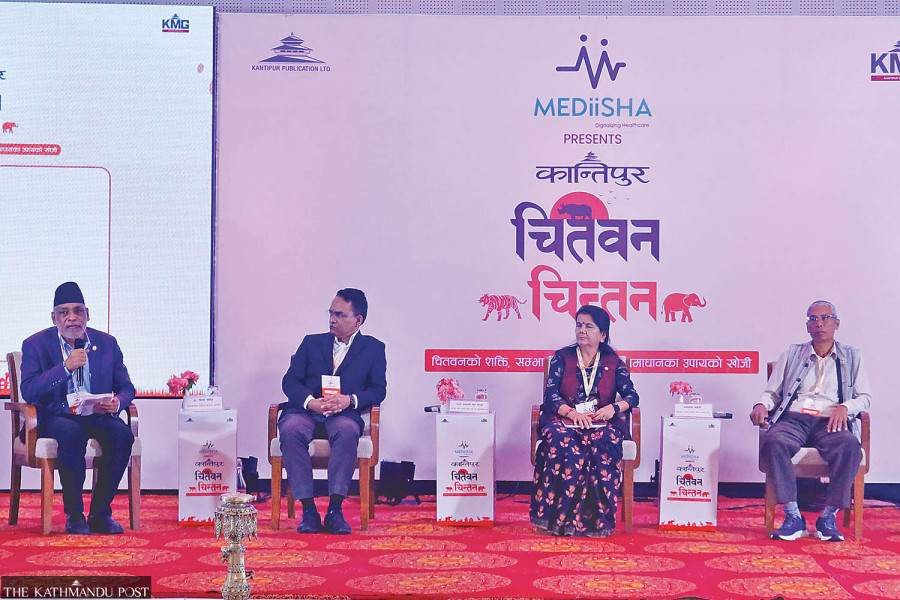National
Leaders, entrepreneurs and experts underscore need for initiatives to tap Chitwan’s potential
Chitwan has of late made significant contributions to the economy through agriculture, service and industrial sectors.
Post Report
Leaders from central, provincial and local levels; entrepreneurs and experts from various sectors have underscored the need for radical reforms in the field of infrastructure, education and health for the prosperity of Chitwan.
The experts said that Chitwan district in recent decades has been making significant contributions to the national economy through production of agricultural goods, expanding service as well as industrial sectors, and developing the area as an educational, health and tourist hub.
The leaders of the three tiers of government, entrepreneurs and noted experts shared their views at the Chitwan Chintan, a day-long interaction organised by the Kantipur Media Group, in Chitwan on Thursday.
Many of the speakers airing their views at the event stressed the need for putting serious efforts to tap the district’s potential not only to change the face of Chitwan but also to uplift the national economy.
Delivering the keynote speech at the event, Bagmati Chief Minister Bahadur Singh Lama Tamang described Chitwan’s importance as a major tourist destination. He shared his plans to develop a tourism circuit connecting Sauraha, Meghauli, Madi and Siraichuli.
He stressed the importance of branding and marketing local agricultural products, stating that “it is essential to identify indigenous foods within the province and register patents to create hotel menus”.
Chief Minister Tamang also said the provincial government is committed to identifying, preserving, and promoting the province’s historical, cultural, religious, archaeological, and natural heritage to build a foundation for the economy and develop the tourism industry.
Federal Minister for Agriculture and Livestock Development Ramnath Adhikari announced that the government would now focus on converting surplus milk into powder milk in a bid to resolve the long-standing issue of ‘milk holidays’ (when dairies do not purchase milk from farmers).
This move, according to him, aims to tackle the recurring problem faced by farmers, particularly during the period from August to October when milk production increases, making it difficult for businesses to purchase all the milk from farmers.
Speaking during the second session of the event, titled “Farmers’ issues at the heart of agriculture,” Adhikari acknowledged the government’s failures in the past to convert surplus milk into powder in enough quantities.
“We have not been able to efficiently turn excess milk into powder for later use. I want to assure you that the government is now implementing a plan to process excess milk into powdered milk to avoid future milk holidays,” he stated.
From mid-August to mid-October, milk production increases significantly, leading to a situation in which dairies stop buying milk from farmers, Adhikari said.
Adhikari criticised the current system where a state agency buys milk from farmers on credit, sells it for a profit of Rs30–35 per litre in cash, and yet fails to pay the farmers promptly. “It’s disheartening that farmers are left unpaid while consumers are charged in cash,” he lamented.
Chitwan alone produces 350,000 litres of milk daily, with 40,000 farmers engaged in the dairy business and 110 dairy cooperatives operating in the region.
Former vice-chair of the National Planning Commission Biswo Poudel said that the efforts aimed at increasing production from the agriculture sector weren’t yielding good results despite several policies and programmes implemented by the government.
“Leaders are quite aware of farmers’ concerns and successive governments over two decades have introduced various policies and programmes to address the issues of this sector,” Poudel said. “But, the problems are so complex that the efforts haven’t yielded effective results.”
Addressing the inaugural session, KMG Chairman Kailash Sirohiya said the event aimed to help empower provincial and local governments by devolving powers from the Centre as per the spirit of the constitution.
“Following the country’s transition to federalism, we initiated this programme from Madhesh Province to focus on federalism issues. We aim to empower provincial and local governments, but we are also shifting our focus towards economic development,” he said.
The first session, ‘Chitwan’s DNA: Health and education,’ focused on the region’s future of health and education. In the second session entitled ‘Farmers’ issues in agricultural heartland’, speakers focused on the challenges farmers face in the region. In the third session, entitled ‘Industry and commerce: Road to rejuvenation,’ participants discussed revival of industry and commerce post-pandemic.
The final session, ‘Prosperity through tourism,’ was focused on tourism’s potential as a growth engine for the region.
Other key speakers included Federal Minister for Culture, Tourism, and Civil Aviation Badri Prasad Pandey, provincial minister for Economic Affairs and Planning of Bagmati Province Kundanraj Kafle and provincial minister for health Kiran Thapa Magar.
Also, policymakers, bankers, industrialists, entrepreneurs and experts of various sectors shared their views during the interactive sessions.




 8.88°C Kathmandu
8.88°C Kathmandu














